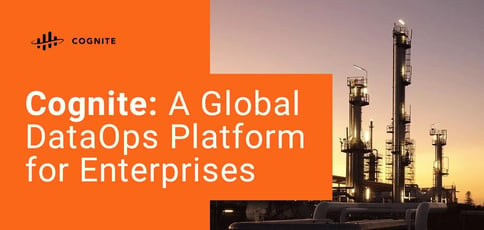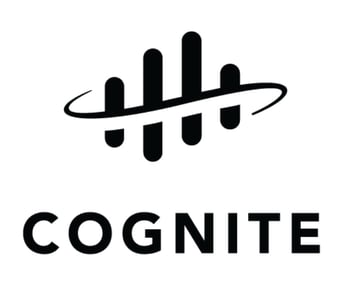
TL; DR: Cognite is a global SaaS provider that supports full-scale digital transformation for customers in asset-heavy industries. Its flagship Industrial DataOps platform, Cognite Data Fusion, enables industrial data and domain users to collaborate and scale industrial AI solutions and applications. Cognite Data Fusion includes industrial domain knowledge that integrates with legacy enterprise ecosystems and promotes scaling that delivers both profitability and sustainability.
While Data Operations (DataOps) began as a set of best practices, it has evolved into a formalized approach to getting more from enterprise data.
According to Forbes, the application of DataOps techniques can transform the way businesses gain insights from analytics. By reducing the cycle time and increasing the quality of analytics results, DataOps presents multiple advantages for companies.
Enterprises base much of their business intelligence on the quality of analytics that their strategists can access. DataOps streamlines that information and allows a company to focus more on reaching goals and less on how to parse operational data.

Cognite aims to quickly contextualize industrial data for value optimization at scale through its SaaS Industrial DataOps platform — Cognite Data Fusion. The Norwegian software provider enables industrial enterprises across a select range of verticals — including oil, gas, energy, and manufacturing — to make decisions on maintenance, production, safety, and process optimization.
“Cognite Data Fusion starts by collecting IT, Operational Technology (OT), and Engineering Technology (ET) data from different sources and making raw data accessible for analytics,” said Petteri Vainikka, VP of Product Marketing at Cognite. “Next, it confirms the data availability and quality by building expert visualizations for real-time diagnostics to provide what we call a digital representation of industrial reality.”
Industrial DataOps Streamlines Development Cycles and Delivery
The resurgent interest in DataOps stems from the recognition that many processes and procedures underperform in specific industries. According to Petteri, it is also a response to a need for greater data collaboration, education, and tooling evolution.
“From a broad perspective, DataOps constitutes a transformative new approach to data ROI,” he said.
While no standard definition exists, many businesses agree with Gartner’s description of DataOps as a collaborative data management practice “focused on improving the communication, integration, and automation of data flows between data managers and data consumers across an organization.”
Gartner said that the overall goal of DataOps is to deliver value faster by creating predictable delivery and change management of data, data models, and related artifacts.

“DataOps uses technology to automate the design, deployment, and management of data delivery with appropriate levels of governance, and it uses metadata to improve the usability and value of data in a dynamic environment,” Gartner wrote.
Cognite Data Fusion’s Industrial DataOps focuses on software and application development. Automation efforts center on the development cycle, software delivery processes, and the elimination of wasteful processes and procedures. Aligning developers, operations, and the business is another overarching goal.
“Continuous and reliable delivery of data will improve the speed and effectiveness of analytics, business intelligence, continuous intelligence, operational data, and data for machine learning applications, to name but a few,” said Petteri. “In addition, the drive toward automation and more reliable pipelines of data is set to minimize risk and multiply data deployment opportunities within enterprises.”
Task-Specific Modules Offer Flexibility to Customize Solutions
A common connection between interpretations of DataOps is the focus on integrating data across different parts of an organization.
“It’s about breaking down silos and optimizing the broad availability and usability of data,” Petteri said. “Ultimately, DataOps aims for predictable data delivery and change management. It uses technology to automate, orchestrate, and operationalize data use and value dynamically.”
Cognite Data Fusion has specific task modules built onto it. Cognite’s BestDay product, for example, uses elements of AI and machine learning to help improve maximum production capacity for user organizations. It accomplishes that by providing real-time organizational visibility on all critical aspects of production.
BestDay’s data-driven AI model calculates daily production capacity based on logged deferments and actual data. That includes information on custom-configured boundary conditions, production criteria, and a set of outlier detection models.
“The BestDay module’s deviation detection models provide a real-time view of the most critical tasks, enabling timely and efficient decision-making,” said Petteri. “Users can go to the source of the issue and request advice from production engineers or suggest changes to better fit the production timeline.”
Maintain and Infield are two other Cognite modules. Maintain aims to decrease the need for planning and scheduling lead time. It helps users handle a more dynamic maintenance strategy efficiently with a larger share of predictive and corrective monitoring.
Infield enables users to access information and insights for operational improvements based on data from different sources. Users can scan or search for equipment tags and complete fieldwork without a trip to the office to print documents.
Revealing the Value of Data to Field Operatives
Cognite Data Fusion seeks to revitalize the value of data analysis and make it accessible to industrial teams that can benefit from its operational value.
“Over the past decade, data governance has not enjoyed any of the hype and executive attention that cloud data storage has received,” said Petteri. “Data governance continues to draw an association with data management hygiene behaviors, including access management and security. But to derive true data value, we say the focus should be on data governance, not storage.”

Cognite began with a mission to liberate operational data and make it available to the workers who keep IT and OT systems running in an optimal state. That starts with lifting the data literacy rate within enterprises.
“That applies especially to those in industrial sectors that are not likely to find the data scientist working out in the field,” Petteri said. “We spend a lot of time out in those fields, on oil rigs, for example, talking to people in the hard hats. That way, we learn a lot about what is at the heart of many industrial business processes.”
Getting those in-depth insights can mean more interest in innovative, data-driven working methods.
“To get field engineers to buy into a new technology — especially one that might fundamentally alter the way they do their jobs — can be a hard sell,” Petteri said
Cognite: Helping Customers with Analytics on Sustainability
Carbon footprint reduction is another operational imperative Cognite Data Fusion supports by delivering data insights that help operations save energy.
“Sustainability expectations have absolutely exploded,” said Petteri. “Sustainability has become embedded in practically every project we are asked to do. It’s now top of mind for everybody.”
As a result, Cognite frequently adds a carbon impact dimension to its productivity optimization projections. That can impact everything along the value chain, Petteri said.
“Our customers’ customers have started to demand carbon reporting for just about everything they do — even down to component level. At Cognite, we used to talk to customers about what we called ‘profitable sustainability.’ Our pitch was that they should not think about sustainability in isolation from their core business processes, which is what a lot of them did.”
Petteri pointed out that a survey of US energy industry leaders conducted by Cognite — along with The Harris Poll and Axios Studio — found that 68% of energy leaders polled believe the industry can reach net-zero emissions by 2050. The survey responses also identified the critical component that will get us there: technology.
Sustainability and business process optimization can go hand in hand with digital transformation agendas, according to Cognite.
“When customers ask if we can help them address both business requirements and their sustainability aims, we say, ‘Yes’ because most of our customers can,” said Petteri.
HostingAdvice.com is a free online resource that offers valuable content and comparison services to users. To keep this resource 100% free, we receive compensation from many of the offers listed on the site. Along with key review factors, this compensation may impact how and where products appear across the site (including, for example, the order in which they appear). HostingAdvice.com does not include the entire universe of available offers. Editorial opinions expressed on the site are strictly our own and are not provided, endorsed, or approved by advertisers.
Our site is committed to publishing independent, accurate content guided by strict editorial guidelines. Before articles and reviews are published on our site, they undergo a thorough review process performed by a team of independent editors and subject-matter experts to ensure the content’s accuracy, timeliness, and impartiality. Our editorial team is separate and independent of our site’s advertisers, and the opinions they express on our site are their own. To read more about our team members and their editorial backgrounds, please visit our site’s About page.



